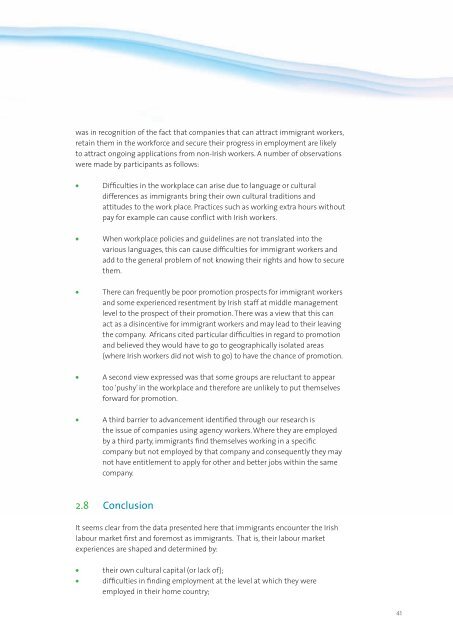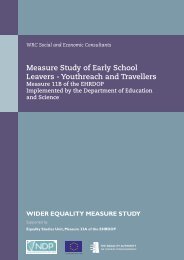Issues and Challenges in the Recruitment and Selection of ...
Issues and Challenges in the Recruitment and Selection of ...
Issues and Challenges in the Recruitment and Selection of ...
Create successful ePaper yourself
Turn your PDF publications into a flip-book with our unique Google optimized e-Paper software.
was <strong>in</strong> recognition <strong>of</strong> <strong>the</strong> fact that companies that can attract immigrant workers,reta<strong>in</strong> <strong>the</strong>m <strong>in</strong> <strong>the</strong> workforce <strong>and</strong> secure <strong>the</strong>ir progress <strong>in</strong> employment are likelyto attract ongo<strong>in</strong>g applications from non-Irish workers. A number <strong>of</strong> observationswere made by participants as follows:• Difficulties <strong>in</strong> <strong>the</strong> workplace can arise due to language or culturaldifferences as immigrants br<strong>in</strong>g <strong>the</strong>ir own cultural traditions <strong>and</strong>attitudes to <strong>the</strong> work place. Practices such as work<strong>in</strong>g extra hours withoutpay for example can cause conflict with Irish workers.• When workplace policies <strong>and</strong> guidel<strong>in</strong>es are not translated <strong>in</strong>to <strong>the</strong>various languages, this can cause difficulties for immigrant workers <strong>and</strong>add to <strong>the</strong> general problem <strong>of</strong> not know<strong>in</strong>g <strong>the</strong>ir rights <strong>and</strong> how to secure<strong>the</strong>m.• There can frequently be poor promotion prospects for immigrant workers<strong>and</strong> some experienced resentment by Irish staff at middle managementlevel to <strong>the</strong> prospect <strong>of</strong> <strong>the</strong>ir promotion. There was a view that this canact as a dis<strong>in</strong>centive for immigrant workers <strong>and</strong> may lead to <strong>the</strong>ir leav<strong>in</strong>g<strong>the</strong> company. Africans cited particular difficulties <strong>in</strong> regard to promotion<strong>and</strong> believed <strong>the</strong>y would have to go to geographically isolated areas(where Irish workers did not wish to go) to have <strong>the</strong> chance <strong>of</strong> promotion.• A second view expressed was that some groups are reluctant to appeartoo ‘pushy’ <strong>in</strong> <strong>the</strong> workplace <strong>and</strong> <strong>the</strong>refore are unlikely to put <strong>the</strong>mselvesforward for promotion.• A third barrier to advancement identified through our research is<strong>the</strong> issue <strong>of</strong> companies us<strong>in</strong>g agency workers. Where <strong>the</strong>y are employedby a third party, immigrants f<strong>in</strong>d <strong>the</strong>mselves work<strong>in</strong>g <strong>in</strong> a specificcompany but not employed by that company <strong>and</strong> consequently <strong>the</strong>y maynot have entitlement to apply for o<strong>the</strong>r <strong>and</strong> better jobs with<strong>in</strong> <strong>the</strong> samecompany.2.8 ConclusionIt seems clear from <strong>the</strong> data presented here that immigrants encounter <strong>the</strong> Irishlabour market first <strong>and</strong> foremost as immigrants. That is, <strong>the</strong>ir labour marketexperiences are shaped <strong>and</strong> determ<strong>in</strong>ed by:• <strong>the</strong>ir own cultural capital (or lack <strong>of</strong>);• difficulties <strong>in</strong> f<strong>in</strong>d<strong>in</strong>g employment at <strong>the</strong> level at which <strong>the</strong>y wereemployed <strong>in</strong> <strong>the</strong>ir home country;41




